Source
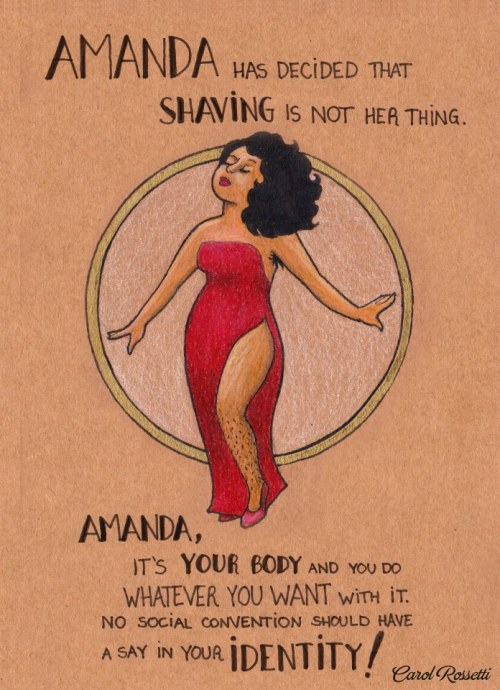
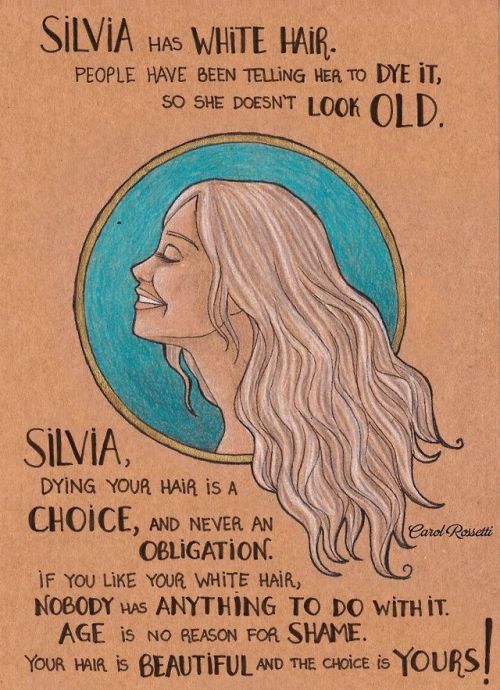
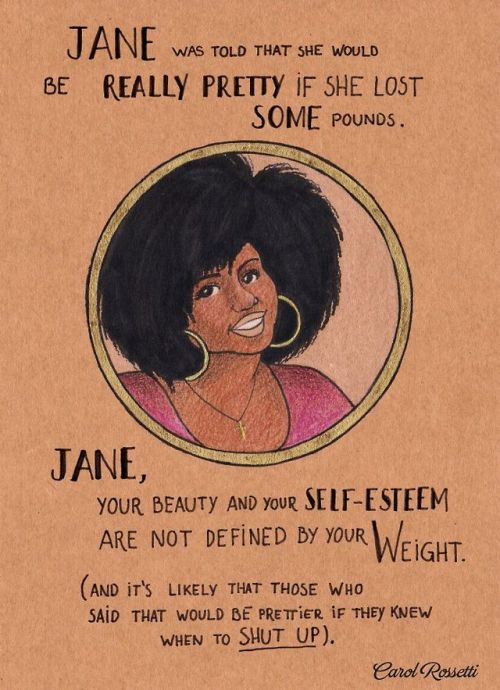
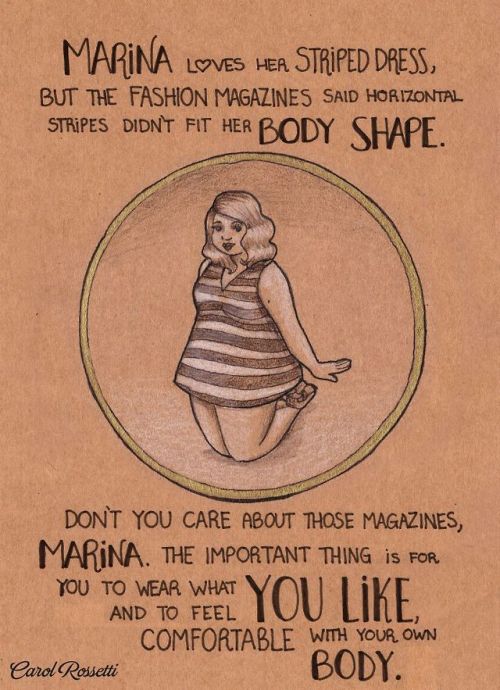

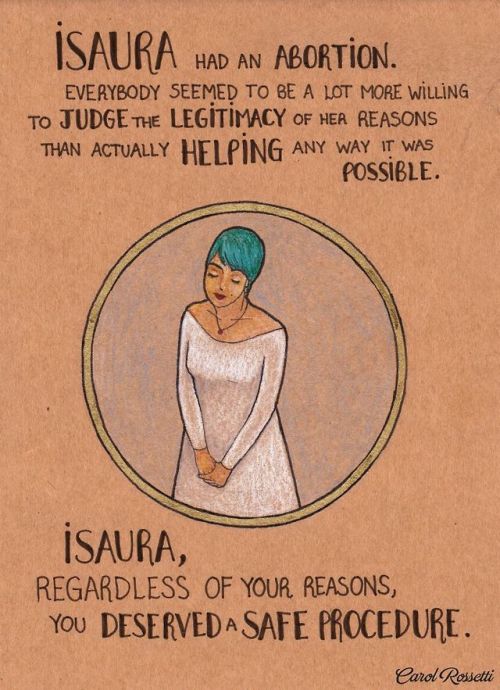

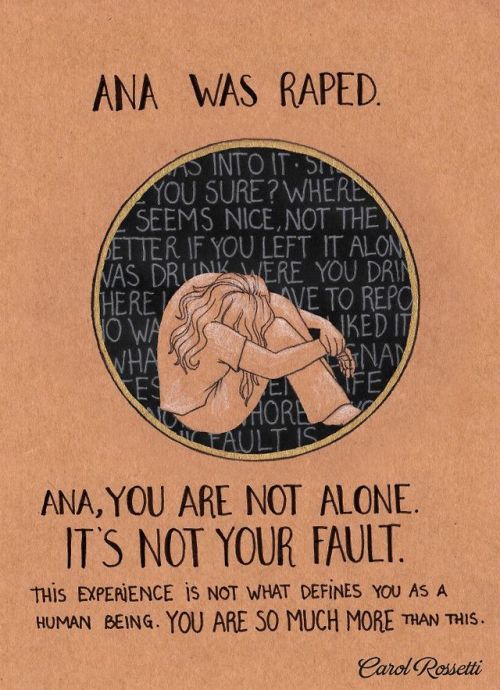

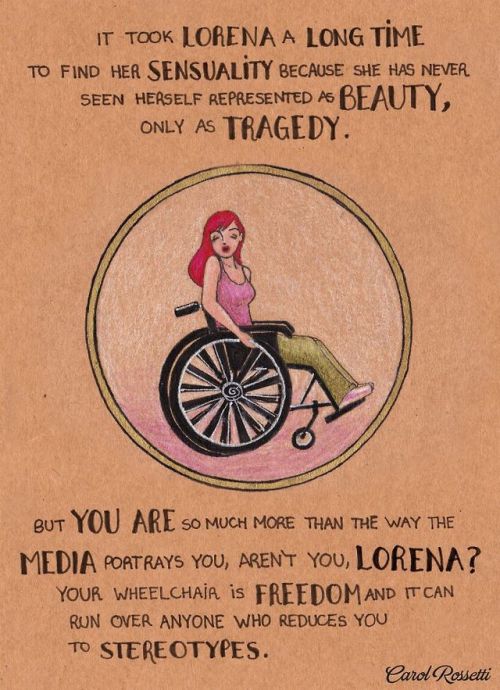








Source
"Image Credit: Carol Rossetti
When Brazilian graphic designer Carol Rossetti began posting colorful illustrations of women and their stories to Facebook, she had no idea how popular they would become.
Thousands of shares throughout the world later, the appeal of Rosetti’s work is clear. Much like the street art phenomenon Stop Telling Women To Smile, Rossetti’s empowering images are the kind you want to post on every street corner, as both a reminder and affirmation of women’s bodily autonomy.
"It has always bothered me, the world’s attempts to control women’s bodies, behavior and identities," Rossetti told Mic via email. "It’s a kind of oppression so deeply entangled in our culture that most people don’t even see it’s there, and how cruel it can be."
Rossetti’s illustrations touch upon an impressive range of intersectional topics, including LGBTQ identity, body image, ageism, racism, sexism and ableism. Some characters are based on the experiences of friends or her own life, while others draw inspiration from the stories many women have shared across the Internet.
"I see those situations I portray every day," she wrote. "I lived some of them myself."
Despite quickly garnering thousands of enthusiastic comments and shares on Facebook, the project started as something personal — so personal, in fact, that Rossetti is still figuring out what to call it. For now, the images reside in albums simply titled “WOMEN in english!" or "Mujeres en español!" which is fitting: Rossetti’s illustrations encompass a vast set of experiences that together create a powerful picture of both women’s identity and oppression.
One of the most interesting aspects of the project is the way it has struck such a global chord. Rossetti originally wrote the text of the illustrations in Portuguese, and then worked with an Australian woman to translate them to English. A group of Israeli feminists also took it upon themselves to create versions of the illustrations in Hebrew. Now, more people have reached out to Rossetti through Facebook and offered to translate her work into even more languages. Next on the docket? Spanish, Russian, German and Lithuanian.
It’s an inspiring show of global solidarity, but the message of Rossetti’s art is clear in any language. Above all, her images celebrate being true to oneself, respecting others and questioning what society tells us is acceptable or beautiful.
"I can’t change the world by myself," Rossetti said. "But I’d love to know that my work made people review their privileges and be more open to understanding and respecting one another."”
From the site: All images courtesy Carol Rossetti and used with permission. You can find more illustrations, as well as more languages, on her Facebook page.
More Posts from You-found-the-wolf and Others






aoi

Flower studies? Yeah, okay
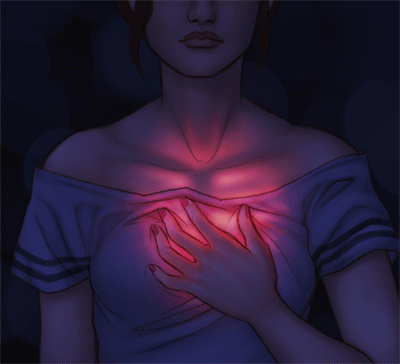

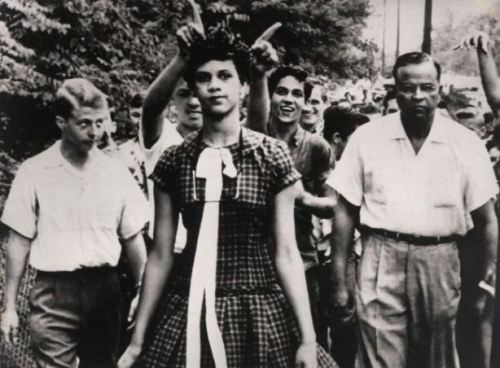




On the morning of September 4, 1957, fifteen-year-old Dorothy Counts set out on a harrowing path toward Harding High, where-as the first African American to attend the all-white school – she was greeted by a jeering swarm of boys who spat, threw trash, and yelled epithets at her as she entered the building.
Charlotte Observer photographer Don Sturkey captured the ugly incident on film, and in the days that followed, the searing image appeared not just in the local paper but in newspapers around the world.
People everywhere were transfixed by the girl in the photograph who stood tall, her five-foot-ten-inch frame towering nobly above the mob that trailed her. There, in black and white, was evidence of the brutality of racism, a sinister force that had led children to torment another child while adults stood by. While the images display a lot of evils: prejudice, ignorance, racism, sexism, inequality, it also captures true strength, determination, courage and inspiration.

Winding down after work. It’s been so busy lately T__T



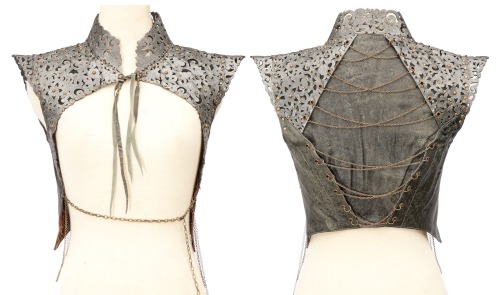


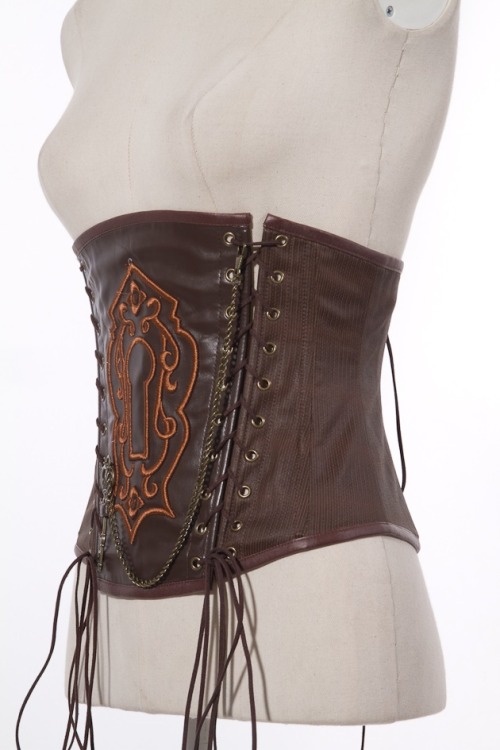




From Verillas
-
 transgender-byrne-faraday liked this · 2 weeks ago
transgender-byrne-faraday liked this · 2 weeks ago -
 mothythemoth liked this · 3 weeks ago
mothythemoth liked this · 3 weeks ago -
 therealpg28 reblogged this · 3 weeks ago
therealpg28 reblogged this · 3 weeks ago -
 therealpg28 liked this · 3 weeks ago
therealpg28 liked this · 3 weeks ago -
 bunkaman liked this · 3 weeks ago
bunkaman liked this · 3 weeks ago -
 owlsounds liked this · 3 weeks ago
owlsounds liked this · 3 weeks ago -
 w3r1d0 liked this · 3 weeks ago
w3r1d0 liked this · 3 weeks ago -
 kiixpronouncedkicks reblogged this · 3 weeks ago
kiixpronouncedkicks reblogged this · 3 weeks ago -
 curliefried reblogged this · 3 weeks ago
curliefried reblogged this · 3 weeks ago -
 defiantfall liked this · 3 weeks ago
defiantfall liked this · 3 weeks ago -
 star-maker-rain-dancer reblogged this · 3 weeks ago
star-maker-rain-dancer reblogged this · 3 weeks ago -
 star-maker-rain-dancer liked this · 3 weeks ago
star-maker-rain-dancer liked this · 3 weeks ago -
 anotheronenokoneofmine liked this · 3 weeks ago
anotheronenokoneofmine liked this · 3 weeks ago -
 poetic-iconoclast liked this · 3 weeks ago
poetic-iconoclast liked this · 3 weeks ago -
 thetoastedalmonds liked this · 3 weeks ago
thetoastedalmonds liked this · 3 weeks ago -
 lifeitself3146 reblogged this · 3 weeks ago
lifeitself3146 reblogged this · 3 weeks ago -
 lifeitself3146 liked this · 3 weeks ago
lifeitself3146 liked this · 3 weeks ago -
 leagallyfine reblogged this · 3 weeks ago
leagallyfine reblogged this · 3 weeks ago -
 leagallyfine liked this · 3 weeks ago
leagallyfine liked this · 3 weeks ago -
 elder-sister reblogged this · 3 weeks ago
elder-sister reblogged this · 3 weeks ago -
 evenmorecreativeusernameiswear reblogged this · 3 weeks ago
evenmorecreativeusernameiswear reblogged this · 3 weeks ago -
 evenmorecreativeusernameiswear reblogged this · 3 weeks ago
evenmorecreativeusernameiswear reblogged this · 3 weeks ago -
 halusifreak reblogged this · 1 month ago
halusifreak reblogged this · 1 month ago -
 adeadbody420 liked this · 1 month ago
adeadbody420 liked this · 1 month ago -
 grapemoon reblogged this · 1 month ago
grapemoon reblogged this · 1 month ago -
 grapemoon liked this · 1 month ago
grapemoon liked this · 1 month ago -
 masterandpunisher liked this · 1 month ago
masterandpunisher liked this · 1 month ago -
 chocolatementalitydream liked this · 1 month ago
chocolatementalitydream liked this · 1 month ago -
 halusifreak liked this · 1 month ago
halusifreak liked this · 1 month ago -
 bokunoheroacademyfan liked this · 2 months ago
bokunoheroacademyfan liked this · 2 months ago -
 herehaveafandom reblogged this · 2 months ago
herehaveafandom reblogged this · 2 months ago -
 pheonixqueen reblogged this · 2 months ago
pheonixqueen reblogged this · 2 months ago -
 pheonixqueen liked this · 2 months ago
pheonixqueen liked this · 2 months ago -
 distantloverof liked this · 2 months ago
distantloverof liked this · 2 months ago -
 er-ramblings liked this · 2 months ago
er-ramblings liked this · 2 months ago -
 whatdoestheducksay4 liked this · 2 months ago
whatdoestheducksay4 liked this · 2 months ago -
 hahadeathgobrrr reblogged this · 2 months ago
hahadeathgobrrr reblogged this · 2 months ago -
 alismakingart liked this · 2 months ago
alismakingart liked this · 2 months ago -
 aizassotomegami liked this · 2 months ago
aizassotomegami liked this · 2 months ago -
 ionianodyssey reblogged this · 2 months ago
ionianodyssey reblogged this · 2 months ago -
 ionianodyssey liked this · 2 months ago
ionianodyssey liked this · 2 months ago -
 cultistfred reblogged this · 2 months ago
cultistfred reblogged this · 2 months ago -
 maldragon-triplet1 reblogged this · 2 months ago
maldragon-triplet1 reblogged this · 2 months ago -
 maldragon-triplet1 liked this · 2 months ago
maldragon-triplet1 liked this · 2 months ago -
 dragonleesupporter liked this · 2 months ago
dragonleesupporter liked this · 2 months ago -
 mostcertainlynotcis reblogged this · 2 months ago
mostcertainlynotcis reblogged this · 2 months ago -
 missspakalot liked this · 3 months ago
missspakalot liked this · 3 months ago
Hello everyone! I'm 17 years-old girl from Poland (Yeah we have Internet). My English sucks. Sorry.
266 posts
